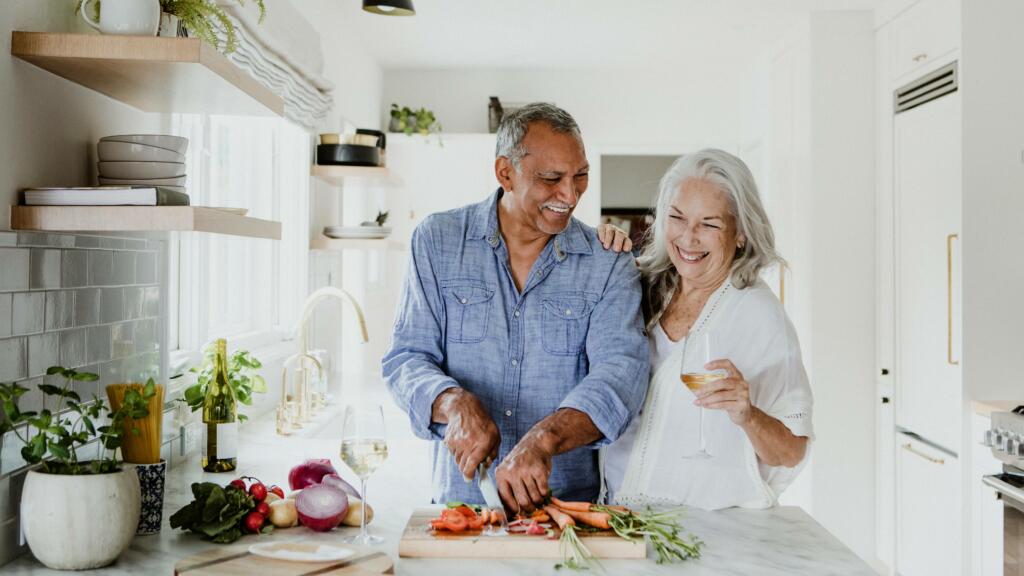
Are air fryers cheap to run? Here’s what you need to know
Jayne Cherrington-Cook
Food prices are continuing to rise, but your health shouldn’t pay the price. Experts share their money-saving food tips so you can still get the nutrients you need.
We’ve been waiting a long time for some good news about the cost-of-living crisis, and here’s some to sink your teeth into – after food and non-alcoholic beverages reached a record-breaking price rise of 19.1% in April 2023, they eased to 17.4% in June.
While this may bring some light relief, food prices are still up 15% year on year, meaning many people still finding it challenging to put nutritious meals on the table – compounded by the ongoing energy crisis driving up household bills.
Reassuringly though, it’s still possible to meet your nutritional needs and eat healthily on a budget, according to dietitian and nutrition consultant Priya Tew, who says: “It just takes more time and planning.”
Here are some ways you can save money on your food shop, without ditching the healthy stuff.
We’ve been waiting a long time for some good news about the cost-of-living crisis, and here’s some to sink your teeth into – after food and non-alcoholic beverages reached a record-breaking price rise of 19.1% in April 2023, they eased to 17.4% in June.
While this may bring some light relief, food prices are still up 15% year on year, meaning many people still finding it challenging to put nutritious meals on the table – compounded by the ongoing energy crisis driving up household bills.
Reassuringly though, it’s still possible to meet your nutritional needs and eat healthily on a budget, according to dietitian and nutrition consultant Priya Tew, who says: “It just takes more time and planning.”
Here are some ways you can save money on your food shop, without ditching the healthy stuff.
 Credit: Shutterstock/Stokkete
Credit: Shutterstock/StokketeThe number of people home cooking might have risen during the Covid-19 pandemic, but since our lives have got busier again, many of us have quickly remembered the ease and convenience of dining out or buying ready-made foods.
However, this isn’t necessarily good for your bank balance or your health. Tew says: “Cooking from scratch is usually cheaper than ordering a takeaway or buying ready-meal options.” Also, many ready-made foods contain additives and too much salt.
Instead of buying pre-made mixes and jars, Tew suggests making your own sauces for things like curries and pasta dishes. “They can be super-cheap, using tinned tomatoes, herbs and spices,” she says.
Soups are another easy option for using whatever ingredients you have to hand, including past-their-best veg, or vegetables from the freezer.
And it’s not just the ingredients you use that might help to cut costs, but the appliances, too. You can cook a variety of things in a microwave or an air fryer faster than in an oven, which can make it more affordable (if you have one already). You don’t need to use a lot of oil either.
If you have a decent amount of outdoor space, you could try growing your own vegetables, which can save costs in the long run. Courgettes are easy to grow and can produce a large harvest from just a few plants. If you don’t have a lot of space for growing veg, you could grow herbs on your windowsill.
Tew believes cooking from scratch can be very rewarding and fun, and tastier, too. So why not set yourself a challenge and see if you can cook at home at least a few times a week, to see how it makes you feel?
Before you head out to the shops in a panic about having nothing for dinner, check your cupboards, fridge and freezer in case for any leftovers or store-cupboard foods you’ve forgotten about. There could be something that you could make a quick and nutritious meal with.
This will also avoid doubling up on unnecessary extras when you do go shopping, as you’ll know exactly what you have in the kitchen.
Tew also suggests planning a ‘leftovers meal’ in advance. “Use all your leftovers out of the fridge to make a stir fry or pasta dish.”
A stir-fry is a particularly great opportunity to add lots of colourful veg to your meal, helping you reach your five-a-day.
As Saga Exceptional’s nutrition writer, I can personally recommend meal planning to help with eating healthily on a budget.
I find sitting down with a pen and paper (and usually a cuppa, too) and listing what I’m going to eat each day of the week helps me avoid going off track and buying expensive or unhealthy products when I go food shopping.
It also takes the stress out of cooking and frees up valuable time if I have a busy week.
Once you have your list, you can shop around for deals and compare prices at different supermarkets using the supermarket price-comparison site Trolley.
 Credit: Shutterstock/Arturs Budkevics
Credit: Shutterstock/Arturs BudkevicsBigger doesn’t necessarily mean more expensive. If you’re buying products that have a long shelf-life (such as tins, frozen foods, pasta and rice), Tew says that larger packets are often better value.
She uses the example of porridge oats, pointing out that larger packs typically work out cheaper than individual sachets. Indeed, at the time of writing a 10-pack of Quaker Oats So Simple Original porridge sachets was £3.50 at Tesco, working out at £1.29 per 100g. Meanwhile, a 1kg box of Quaker Rolled Oats at the same supermarket was priced at £2.30 – equivalent to just 23 pence per 100g.
 Credit: Trolley.co.uk
Credit: Trolley.co.ukFor fresh items, Tew also advises buying in bulk and storing the surplus. She says: “For example, buying larger cuts of meat is usually cheaper [than buying smaller portions]. These can then be portioned up and frozen.”
Good places to buy in bulk include cash and carry stores, ‘weigh and pay’ shops (where you fill your own containers and pay based on the weight), and discount retailers such as Costco.
However, Tew warns that these won’t always be the cheapest option for each product, so it’s worth doing a price comparison.
To help with this, Tew advises checking the price per kilogram or 100g/ml, which is usually written under the price of the item (as per the porridge example above).
She suggests keeping a list of these on your phone or a notepad for the main products you usually buy to refer to when out shopping. While it may take a bit of extra effort and organisation, it’s worth it and will soon become second nature.
Think fresh is always best? Think again. Frozen fruit and vegetables can be just as good for you or, in some cases, even better.
Fresh fruit and veg lose some of their nutrients in the time between being picked and ending up on your plate. In contrast, those that are frozen shortly after they’ve been harvested preserve these nutrients.
Frozen fruit and veg is typically cheaper to buy too, helping you to eat healthily on a budget. Plus you can defrost just the amount you need, so there’s no waste.
Tew says: “You can get all kinds of frozen fruit and vegetables, including butternut squash and berries.
“The texture is different for some frozen veg, but they store well and there is a significant cost saving.”
Tew says frozen fruit makes for good yogurt or breakfast toppings. Eating a variety of fruit and veg, whether frozen or fresh, will also support the diversity of your gut bacteria, which is one way you can improve your overall gut health.
 Credit: Shutterstock/Plateresca
Credit: Shutterstock/PlaterescaSearching for a way to make your meals stretch further? Adding dried pulses could be a solution as Tew explains that they help to bulk meals out in a more affordable way. She says: “Dried foods like beans or lentils can be more expensive to buy initially, but work out cheaper than using tinned or packet options in the long run.”
What’s more, pulses are a great source of healthy nutrients like protein and fibre, and provide various health benefits.
Cooking dried beans from scratch does take a bit more planning, as you’ll need to soak them, and the extra cooking will increase fuel costs.
If these put you off, lentils can be a great choice, as they don’t need any soaking, and they cook more quickly than dried beans. If you have a pressure cooker, it’s a great tool to cook beans or lentils in less than half the time, saving you money on fuel.
For a more convenient option, tinned beans and lentils are still cheaper than meat and don’t need much cooking, so they are a great way to pad out meaty dishes like stews, chilli or bolognese sauces. Simply half the amount of meat in the recipe and substitute with beans or lentils, or else replace it altogether.
Fruits and vegetables that are in season are not only tastier and fresher, meaning there is less chance for nutrient loss, but they’re cheaper, too. This is because they’re in abundance and require little storage, transporting and associated costs.
Not sure what is in season right now? Take a look at the Vegetarian Society’s helpful guide to see what foods are in season at different times of the year.
Why are food prices rising and when will it stop?
A combination of soaring energy prices, Brexit and supply-chain disruption caused by the war in Ukraine have been – and still are – largely to blame for the continuation of food prices rising.
The jump in price of supermarket groceries contributed to inflation rates in food being the highest for more than 45 years in March and April 2023, according to the Office for National Statistics.
Now the increase in food prices has eased, but they are still up year on year. For example, the price of fish rose from 14.2% to 16.6% in the year to May 2023.
According to the British Retail Consortium, this easing might be a sign that food inflation has peaked and that prices will fall in the near future.

Written by Gemma Harris she/her
Published: Updated:
Gemma Harris has been a journalist for over seven years and is a self-confessed health and wellbeing enthusiast, which led her to specialise in health journalism. During her career, she has worked with top editors in the industry and taken on multiple high-discipline fitness challenges for certain outlets. She is particularly passionate about nutrition; after being diagnosed with irritable bowel syndrome in 2016, she discovered her fascination for gut health and founded thegutchoice.com – a dedicated space for providing a hopeful outcome for people with gut issues. Gemma’s core aim is to help others through her writing.

Jayne Cherrington-Cook

Camilla Sharman

Gemma Harris

Rosanna Spence